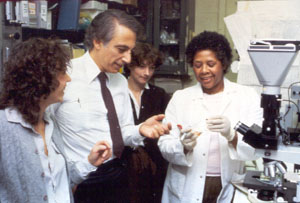Robert Gallo
Robert Charles Gallo (born March 23, 1937) is an American biomedical researcher. He is best known for his role in the discovery of the Human Immunodeficiency Virus (HIV) as the infectious agent responsible for Acquired Immune Deficiency Syndrome (AIDS) and his development of the HIV blood test. Gallo's work has been instrumental in understanding the viral mechanisms of HIV/AIDS and in the development of antiretroviral therapies.
Early Life and Education[edit | edit source]
Robert Gallo was born in Waterbury, Connecticut, to a working-class family of Italian descent. He pursued his undergraduate studies at Providence College in Rhode Island, where he earned a degree in Biology. Following this, Gallo attended Jefferson Medical College in Philadelphia, Pennsylvania, where he received his M.D. in 1963. He then completed his internship and residency in internal medicine at the University of Chicago's Billings Hospital.
Career and Research[edit | edit source]
After completing his medical training, Gallo joined the National Cancer Institute (NCI) in 1965, where he began his career in research. His early work focused on leukemia and the role of retroviruses in cancers. In the 1970s, Gallo's research contributed to the discovery of the first human retrovirus, Human T-lymphotropic virus 1 (HTLV-1), which is linked to T-cell leukemia. In the early 1980s, amidst the emerging AIDS epidemic, Gallo and his team at the NCI conducted research that led to the identification of HIV as the cause of AIDS. In 1984, Gallo and his colleagues published a series of scientific papers that demonstrated that HIV was the AIDS virus. This discovery was pivotal in understanding the disease and laid the groundwork for developing diagnostic tests and treatments for AIDS. Gallo's work on HIV/AIDS has not been without controversy. In 1984, a dispute arose between Gallo's team and French researchers led by Luc Montagnier at the Pasteur Institute over the discovery of the virus. The controversy was eventually resolved in 1987 when both parties agreed that Montagnier's team was the first to isolate the virus, but Gallo's group had provided the first conclusive evidence that HIV was the cause of AIDS.
Later Career[edit | edit source]
In 1996, Gallo co-founded the Institute of Human Virology (IHV) at the University of Maryland School of Medicine, where he serves as Director. The IHV combines the disciplines of research, patient care, and prevention programs in a concerted effort to combat chronic viral diseases, most notably HIV.
Awards and Honors[edit | edit source]
Robert Gallo has received numerous awards and honors for his contributions to science and medicine, including the Lasker Award in 1986 and the Japan Prize in 1988. He is a member of the National Academy of Sciences and has been awarded several honorary degrees from universities around the world.
Legacy[edit | edit source]
Gallo's work has had a profound impact on the understanding and treatment of HIV/AIDS. His research has paved the way for the development of HIV testing, which has been crucial in controlling the spread of the virus, and for the advancement of antiretroviral therapy, which has transformed HIV from a fatal disease to a manageable chronic condition for many people.
See Also[edit | edit source]
Search WikiMD
Ad.Tired of being Overweight? Try W8MD's physician weight loss program.
Semaglutide (Ozempic / Wegovy and Tirzepatide (Mounjaro / Zepbound) available.
Advertise on WikiMD
|
WikiMD's Wellness Encyclopedia |
| Let Food Be Thy Medicine Medicine Thy Food - Hippocrates |
Translate this page: - East Asian
中文,
日本,
한국어,
South Asian
हिन्दी,
தமிழ்,
తెలుగు,
Urdu,
ಕನ್ನಡ,
Southeast Asian
Indonesian,
Vietnamese,
Thai,
မြန်မာဘာသာ,
বাংলা
European
español,
Deutsch,
français,
Greek,
português do Brasil,
polski,
română,
русский,
Nederlands,
norsk,
svenska,
suomi,
Italian
Middle Eastern & African
عربى,
Turkish,
Persian,
Hebrew,
Afrikaans,
isiZulu,
Kiswahili,
Other
Bulgarian,
Hungarian,
Czech,
Swedish,
മലയാളം,
मराठी,
ਪੰਜਾਬੀ,
ગુજરાતી,
Portuguese,
Ukrainian
Medical Disclaimer: WikiMD is not a substitute for professional medical advice. The information on WikiMD is provided as an information resource only, may be incorrect, outdated or misleading, and is not to be used or relied on for any diagnostic or treatment purposes. Please consult your health care provider before making any healthcare decisions or for guidance about a specific medical condition. WikiMD expressly disclaims responsibility, and shall have no liability, for any damages, loss, injury, or liability whatsoever suffered as a result of your reliance on the information contained in this site. By visiting this site you agree to the foregoing terms and conditions, which may from time to time be changed or supplemented by WikiMD. If you do not agree to the foregoing terms and conditions, you should not enter or use this site. See full disclaimer.
Credits:Most images are courtesy of Wikimedia commons, and templates, categories Wikipedia, licensed under CC BY SA or similar.
Contributors: Prab R. Tumpati, MD


